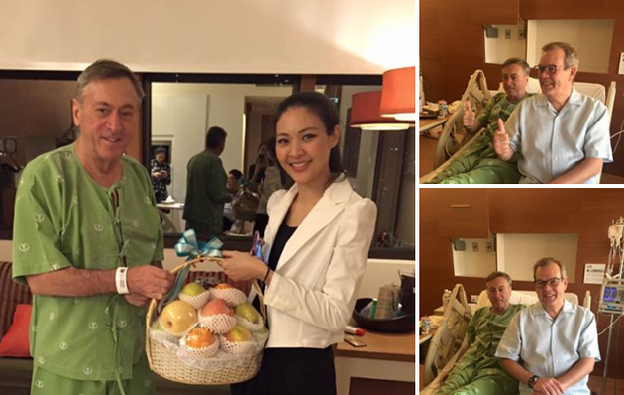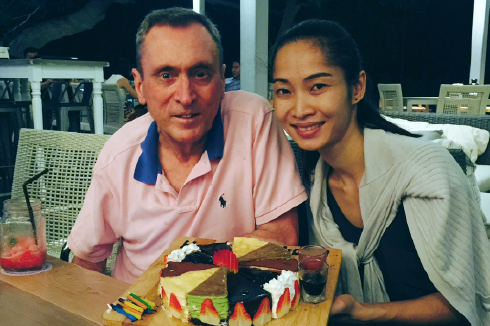| Nearly a year after being diagnosed with Lymphoma, property expert Nigel Cornick talks about his battle with the disease and his long road to recovery By Colin Hastings BRITISH businessman Nigel Cornick is marking his 25th year in Thailand. And he’s doing so with an enormous sense of gratitude and unimaginable personal relief. For less than a year ago, this well-known expat was diagnosed with lymphoma, a form of blood cancer that plays havoc with the immune system. Tests at an international hospital showed that the disease had already spread from stage one to the much more dangerous stage four. The fifth stage is often fatal. Nigel, not surprisingly, was in shock. For someone with such a famously huge appetite for life, the prospects were looking decidedly bleak. |
 Regular visits by friends and colleagues kept Nigel’s mind off his predicament
Regular visits by friends and colleagues kept Nigel’s mind off his predicament Today, amazingly, 63-year-old Nigel is on the road to recovery. The chemotherapy, which ravaged his body to such an extent that at one point some of his colleagues were expecting the worst, has worked. And although he’s still some way from the good health he enjoyed for most of his life, Nigel has beaten this dreaded disease. But there’s no question it’s been a tough year.
Born in Dorchester, England, Nigel spent five years in both Saudi Arabia and Australia before landing in Bangkok to work for Colliers Jardine’s, a major property consultancy company. After a brief spell with another company, he joined Raimon Land as CEO, which marked the beginning of his 13-year association with the firm that saw him become one of the industry’s high fliers.
Along the way, Nigel earned a reputation as a marketing renegade who believed that developing and selling condominiums should be fun. His Raimon Land parties were legendary, with the cream of the crop of Bangkok and Phuket society letting their hair down and making lots of headlines, while propelling the company to the forefront of the nation’s property business.
After leaving Raimon Land in 2009, he worked briefly with Binswanger Brooker before teaming up with fellow investors in Kingdom Property to build the five-star South Point condo in Pattaya.
His only brush with illness during those early years came in 1994. “I had eaten something which caused stomach problems that spread into my liver. I was admitted to the hospital and, after extensive drug treatment, was quickly cleared.
“It’s the only time in my life that I’d been in the hospital. Until then, I had always enjoyed good health,” says Nigel, a father of three sons, all living in Australia, and a daughter who lives in Thailand.
“In fact, we have no history of serious illnesses in our family. My Dad is 85 and Mum is 80.”
It was in April last year that he first noticed that there was something not quite right with his own health. “It turned out to be an infection in my chest, which became pneumonia and I spent a week in the hospital. Doctors initially thought it was due to a kidney problem.
“Then, from May to September, I started to feel tired and run down. In November, I had a scan, which showed up my lymphoma problem. The computer had these yellow dots of light – I’ll never forget them – indicating cancer in my blood.
“Results of the biopsy came on Friday, November 13, the same day as the terrorist bombings and shootings in Paris. I remembered it well.
“The doctor came up to me and said, ‘I’m sorry to tell you this but what you have is stage 4 cancer, and we’ve got to do something about it right now.’”
Wisely, he sought a second opinion and through contacts in the US emailed the result of biopsy to the renowned John Hopkins University Hospital in Baltimore.
“They’re very good people, and when they got back to me, they said, ‘If you were coming to us, we’d do the same as your doctors are recommending,’”
That recommendation was six doses of chemotherapy in a series of 21-day cycles, with Nigel alternating between the hospital and home. In theory, the treatment would last 126 days in total.
The first session took place on December 10 last year. “This is another date I remember well. It was the day after the British Chamber of Commerce’s traditional Christmas lunch, and it was the last time I had an alcoholic drink.
“After the first chemotherapy, I got a stomach and chest-related infection which lasted for a few days. At one point my temperature was up to 38 degrees, so it was back to the hospital because my immune system was crashing. My white blood cell count, which is usually at least 4,500, 4,500 to 11,000 per microlite, had dropped to 1,000. Your stamina and strength go, so you have to take heavy steroids.”
Back at home, Nigel had many visitors, friends as well as colleagues. Throughout his illness, Nigel gave regular updates on his progress via Facebook and received many hundreds of messages wishing him well in return. Sharing his experiences was a welcome source of comfort and emotional support, especially when things got worse – which they did.
His eldest son and twin sons arrived from Australia and stayed in Bangkok long enough to see their father through to the second chemotherapy in early January of this year. This proved relatively straightforward, though his hair started to fall out in clumps which prompted Nigel to go for the ‘Yul Brynner’ look.
The third chemotherapy also produced few side effects and, for a while, Nigel was in good spirits.
Then in March, the fourth chemotherapy was administered and Nigel was suddenly plunged into a health free-fall. “This is the one that put me back into the hospital. The reaction to the drugs was severe. I contracted pneumonia, a stomach infection, a lung infection and even a brain infection – a bit like meningitis, swelling of the brain.
“In early April, I was in ICU for 14 days – this was my lowest point, a critical period. I was completely out of it, and the only thing I can remember of that time are my dreams. Nothing else.”
Slowly, with the help of more drugs, Nigel pulled through this dark period. He then underwent a PET (Positron Emission Tomography) scan, which injected radioactive tracers into the body to determine the progress of cancer treatment. “There was no sign of lymphoma,” said Nigel. “It was amazing. I then had a biopsy on my bone marrow, and again there was no trace of cancer. By mid-June, internally, my cancer had gone.”
The last two chemotherapy sessions were deemed unnecessary and Nigel was allowed back home.
The treatment had taken its toll, however, and Nigel was confined to his bed for the next three months so that his body could recover from the effects of the powerful drugs used in chemotherapy. At one point, his weight had dropped to under 60kgs, ten less than normal, leaving him with sunken cheeks and an alarmingly thin look.
Although his white blood cells count is still low and any sort of infection now could have serious consequences, Nigel says he is feeling better than he first left the hospital “by a factor of ten.”
He goes to the gym in his condominium regularly and his weight has increased to 76kgs, the heaviest he’s been in years. A recent fall has affected his ankle and, for now, he needs help to get around. “That’s just a temporary setback,” he says. “If it wasn’t for that damned ankle, I’d be a lot more mobile.”
Today, he reflects long and hard about his illness. He knows, for example, that cancer could return at any time, though if it’s not back within the next five years, that’s unlikely to happen. By coincidence, his son’s wife had lymphoma when she was 15. Happily, that was cleared up and she’s had no recurrence of the disease.
He also recalls a much earlier warning sign that cancer might be present in his body. “For years I had a lump in my neck. I took no notice of it and thought it would eventually go away. It didn’t.”
Nigel is thankful too that the disease was diagnosed when it was. “We got it at stage four. Any later and I would most likely be dead.”
He’s hoping to return to work early 2017 and praises his partners in Kingdom Property for their support throughout his illness. “They gave me a clear mandate to get better,” he says.
He is also full of praise for the health care he continues to receive. “For four months, I had to wear diapers. Just imagine,” he says. “The doctors and nurses are first class, and underline Thailand’s upside as a health care centre. For good reason, it’s a booming industry.”
But his kindest words are for Cee, his long-term girlfriend, who has been at his side throughout the illness. “I am very lucky to have her. She’s been wonderful – a life saver. I am forever grateful to Cee.”
Until his ankle heals, Nigel is house-bound. In addition to twice-daily treatments and visits by his physiotherapist, he spends his time following the US election on TV and “sending out usually negative comments about Donald Trump on Facebook,” he jokes.
When asked about the funding of such exhaustive treatment, he has some interesting advice, “People should think long and hard about health insurance. Once you become seriously sick, there’s no way of increasing the coverage.”
Ever grateful and happy to be nearing full health again, Nigel is now looking forward to marking new milestones in the country he loves.
Born in Dorchester, England, Nigel spent five years in both Saudi Arabia and Australia before landing in Bangkok to work for Colliers Jardine’s, a major property consultancy company. After a brief spell with another company, he joined Raimon Land as CEO, which marked the beginning of his 13-year association with the firm that saw him become one of the industry’s high fliers.
Along the way, Nigel earned a reputation as a marketing renegade who believed that developing and selling condominiums should be fun. His Raimon Land parties were legendary, with the cream of the crop of Bangkok and Phuket society letting their hair down and making lots of headlines, while propelling the company to the forefront of the nation’s property business.
After leaving Raimon Land in 2009, he worked briefly with Binswanger Brooker before teaming up with fellow investors in Kingdom Property to build the five-star South Point condo in Pattaya.
His only brush with illness during those early years came in 1994. “I had eaten something which caused stomach problems that spread into my liver. I was admitted to the hospital and, after extensive drug treatment, was quickly cleared.
“It’s the only time in my life that I’d been in the hospital. Until then, I had always enjoyed good health,” says Nigel, a father of three sons, all living in Australia, and a daughter who lives in Thailand.
“In fact, we have no history of serious illnesses in our family. My Dad is 85 and Mum is 80.”
It was in April last year that he first noticed that there was something not quite right with his own health. “It turned out to be an infection in my chest, which became pneumonia and I spent a week in the hospital. Doctors initially thought it was due to a kidney problem.
“Then, from May to September, I started to feel tired and run down. In November, I had a scan, which showed up my lymphoma problem. The computer had these yellow dots of light – I’ll never forget them – indicating cancer in my blood.
“Results of the biopsy came on Friday, November 13, the same day as the terrorist bombings and shootings in Paris. I remembered it well.
“The doctor came up to me and said, ‘I’m sorry to tell you this but what you have is stage 4 cancer, and we’ve got to do something about it right now.’”
Wisely, he sought a second opinion and through contacts in the US emailed the result of biopsy to the renowned John Hopkins University Hospital in Baltimore.
“They’re very good people, and when they got back to me, they said, ‘If you were coming to us, we’d do the same as your doctors are recommending,’”
That recommendation was six doses of chemotherapy in a series of 21-day cycles, with Nigel alternating between the hospital and home. In theory, the treatment would last 126 days in total.
The first session took place on December 10 last year. “This is another date I remember well. It was the day after the British Chamber of Commerce’s traditional Christmas lunch, and it was the last time I had an alcoholic drink.
“After the first chemotherapy, I got a stomach and chest-related infection which lasted for a few days. At one point my temperature was up to 38 degrees, so it was back to the hospital because my immune system was crashing. My white blood cell count, which is usually at least 4,500, 4,500 to 11,000 per microlite, had dropped to 1,000. Your stamina and strength go, so you have to take heavy steroids.”
Back at home, Nigel had many visitors, friends as well as colleagues. Throughout his illness, Nigel gave regular updates on his progress via Facebook and received many hundreds of messages wishing him well in return. Sharing his experiences was a welcome source of comfort and emotional support, especially when things got worse – which they did.
His eldest son and twin sons arrived from Australia and stayed in Bangkok long enough to see their father through to the second chemotherapy in early January of this year. This proved relatively straightforward, though his hair started to fall out in clumps which prompted Nigel to go for the ‘Yul Brynner’ look.
The third chemotherapy also produced few side effects and, for a while, Nigel was in good spirits.
Then in March, the fourth chemotherapy was administered and Nigel was suddenly plunged into a health free-fall. “This is the one that put me back into the hospital. The reaction to the drugs was severe. I contracted pneumonia, a stomach infection, a lung infection and even a brain infection – a bit like meningitis, swelling of the brain.
“In early April, I was in ICU for 14 days – this was my lowest point, a critical period. I was completely out of it, and the only thing I can remember of that time are my dreams. Nothing else.”
Slowly, with the help of more drugs, Nigel pulled through this dark period. He then underwent a PET (Positron Emission Tomography) scan, which injected radioactive tracers into the body to determine the progress of cancer treatment. “There was no sign of lymphoma,” said Nigel. “It was amazing. I then had a biopsy on my bone marrow, and again there was no trace of cancer. By mid-June, internally, my cancer had gone.”
The last two chemotherapy sessions were deemed unnecessary and Nigel was allowed back home.
The treatment had taken its toll, however, and Nigel was confined to his bed for the next three months so that his body could recover from the effects of the powerful drugs used in chemotherapy. At one point, his weight had dropped to under 60kgs, ten less than normal, leaving him with sunken cheeks and an alarmingly thin look.
Although his white blood cells count is still low and any sort of infection now could have serious consequences, Nigel says he is feeling better than he first left the hospital “by a factor of ten.”
He goes to the gym in his condominium regularly and his weight has increased to 76kgs, the heaviest he’s been in years. A recent fall has affected his ankle and, for now, he needs help to get around. “That’s just a temporary setback,” he says. “If it wasn’t for that damned ankle, I’d be a lot more mobile.”
Today, he reflects long and hard about his illness. He knows, for example, that cancer could return at any time, though if it’s not back within the next five years, that’s unlikely to happen. By coincidence, his son’s wife had lymphoma when she was 15. Happily, that was cleared up and she’s had no recurrence of the disease.
He also recalls a much earlier warning sign that cancer might be present in his body. “For years I had a lump in my neck. I took no notice of it and thought it would eventually go away. It didn’t.”
Nigel is thankful too that the disease was diagnosed when it was. “We got it at stage four. Any later and I would most likely be dead.”
He’s hoping to return to work early 2017 and praises his partners in Kingdom Property for their support throughout his illness. “They gave me a clear mandate to get better,” he says.
He is also full of praise for the health care he continues to receive. “For four months, I had to wear diapers. Just imagine,” he says. “The doctors and nurses are first class, and underline Thailand’s upside as a health care centre. For good reason, it’s a booming industry.”
But his kindest words are for Cee, his long-term girlfriend, who has been at his side throughout the illness. “I am very lucky to have her. She’s been wonderful – a life saver. I am forever grateful to Cee.”
Until his ankle heals, Nigel is house-bound. In addition to twice-daily treatments and visits by his physiotherapist, he spends his time following the US election on TV and “sending out usually negative comments about Donald Trump on Facebook,” he jokes.
When asked about the funding of such exhaustive treatment, he has some interesting advice, “People should think long and hard about health insurance. Once you become seriously sick, there’s no way of increasing the coverage.”
Ever grateful and happy to be nearing full health again, Nigel is now looking forward to marking new milestones in the country he loves.




















